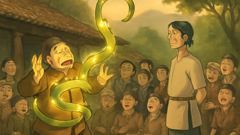Introduction
Nestled between emerald-green paddies and winding rivers, ancient Vietnam thrived under a golden sun and the watchful gaze of the bamboo forests. Life here pulsed with the rhythm of planting and harvest, where villagers toiled from dawn to dusk, bound by the cycles of nature and the whims of those who owned the land. Among these villagers was Khoai, a young man known across the hamlets not for wealth or birthright, but for his unyielding honesty and the kindness etched into every line of his face. Orphaned at a young age, Khoai found comfort in the arms of nature, learning the secrets of the fields, the ways of the animals, and the gentle songs of the wind that rustled through bamboo groves. Yet even in this idyllic world, shadows loomed—none darker than those cast by greed. On the outskirts of the village stood the house of the landlord, a man whose riches were only matched by his cunning. His fields sprawled farther than the eye could see, and his words slithered like vipers, promising much and delivering little. It was said the landlord’s heart was as hard as the rocks beneath the rice paddies, and just as cold. When Khoai, seeking honest work, entered the landlord’s service, he did so with hope rather than fear, believing diligence and goodness could overcome any obstacle. He could not have known then that his journey would become the stuff of legend—a tale of hardship and cunning, of a magical bamboo, and of justice triumphing where all seemed lost. In this story, the whisper of the wind carries more than the scent of ripening rice; it bears a lesson as enduring as the hundred knots of a bamboo stalk, teaching that even the humblest can shape the world when wit and heart walk hand in hand.
Khoai and the Landlord’s Impossible Promise
Khoai was born with little, but what he lacked in worldly possessions, he made up for with resolve and skill. Each morning, he rose before the cocks crowed, his hands as familiar with the feel of water buffalo reins as they were with the tender shoots of rice. The villagers respected him, not for riches, but for his willingness to help, for the easy smile that never seemed to fade, and for the way he treated even the smallest creatures with care. When the seasons turned and drought withered the fields, or when floods threatened the village’s humble homes, Khoai was always the first to act and the last to leave.

News of his reputation eventually reached the ears of the landlord, a man named Ba Quan. Ba Quan was notorious not only for his vast lands but for his shrewdness. He was always seeking ways to expand his wealth with as little effort as possible. When his daughter, the gentle and lovely Mai, reached the age of marriage, Ba Quan saw not a reason for celebration but an opportunity for gain. Many suitors came, bringing gifts, but none satisfied Ba Quan’s insatiable appetite for advantage. When Khoai came seeking work, Ba Quan saw a chance to exploit the young man’s diligence.
Ba Quan summoned Khoai to his ornate house. The air inside was thick with the scent of sandalwood and the hush of servants’ footsteps. Ba Quan regarded Khoai with eyes sharp as knives. “You wish to serve on my estate?” he asked. “Very well. But only the most worthy may win such an honor. I have an impossible task for you.”
Khoai listened, never blinking. “If you clear the wild bamboo forest behind my house—every root, every stalk—and prepare the land for planting before the year’s end, I shall reward you with the greatest gift in my house. I will give you my daughter Mai’s hand in marriage.”
Whispers ran through the village when they heard the terms. No one dared speak against Ba Quan, but all knew the forest was dense and unruly. Bamboo roots ran deep, twisted together in a stubborn web. Yet Khoai, gazing at Mai’s shy smile and the hope in her eyes, nodded his acceptance. Ba Quan smiled—a thin, cold stretch of lips—believing that his wealth and position would protect him from ever having to fulfill his promise. To him, Khoai was just another tool to be used and discarded.
Days turned to weeks, and Khoai set to work. The sun burned and the rains lashed, but his resolve never wavered. Villagers watched from afar, sometimes offering water or a morsel of food, but the task was Khoai’s alone. Every day he cleared a patch of bamboo, digging and hacking, his hands blistered and his back aching. The forest seemed endless, its roots clutching the earth in a tenacious grip. But Khoai pressed on, driven by love and the conviction that a promise should be honored, no matter how daunting.
As months slipped by, even Ba Quan was impressed, though he would never admit it aloud. He began to worry. By harvest, only a thin strip of bamboo remained. Khoai’s hands were raw, his clothes patched with careful stitches, but his eyes shone with hope. Mai often watched him from behind her window, her heart fluttering with a secret joy. She believed in Khoai’s goodness and prayed each night for his success. The landlord, meanwhile, schemed in silence, unwilling to accept that his trap might ensnare him instead.
A Magical Encounter in the Bamboo Grove
One dusk, as Khoai wrestled with a stubborn root, he paused to rest against a fallen stalk. The forest was quiet, the only sound the distant chirr of insects and the soft rustling of leaves. Suddenly, an old man appeared at the edge of the clearing. His beard was long and white as mountain mist, his robes plain but spotless, and his eyes gleamed with a knowing light. He carried a slender staff made from bamboo, polished smooth by age and use.

The old man spoke with a voice as gentle as wind through leaves. “Young Khoai, I have watched you work day after day, never complaining, never faltering. Why do you labor so?”
Khoai bowed respectfully. “A promise was made, honored sir. I must finish this task, though it may break me.”
The old man’s eyes twinkled. “Promises are the bones of the world. But some bones break, while others bend.” He reached into his robe and drew out a small bottle filled with clear, shimmering liquid. “You have earned a friend among spirits and men alike. If you need help, sprinkle this on a bamboo stalk and say aloud: ‘Grow, O bamboo, grow—with a hundred knots show.’”
Khoai thanked the old man, tucking the bottle into his sash. By the time he turned to speak again, the stranger had vanished as suddenly as he’d appeared, leaving behind only the scent of rain on dry earth.
From that night on, Khoai’s work became lighter. He reserved the gift, not wanting to waste it unless he truly needed it. As he cleared the last of the bamboo, he returned each evening to the spot where he’d met the old man, pondering the meaning of his words. It seemed that with every swing of his blade, he was not just cutting bamboo, but also carving his own fate.
By year’s end, Khoai had done what none thought possible. The bamboo forest stood no more. The ground lay smooth and ready for planting. Villagers came to see the miracle, marveling at Khoai’s strength and persistence. Word reached Ba Quan, who now realized his trick might bring consequences. Unwilling to lose his daughter—or admit defeat—he plotted a final betrayal. Ba Quan greeted Khoai with feigned warmth. “You have done well,” he said, offering rice wine and a seat at his table. “But I must see proof of your devotion. Before the wedding, bring me a single bamboo stalk with exactly one hundred knots. Only then will my word be fulfilled.”
A gasp rippled through those gathered. Everyone knew no bamboo grew with a hundred knots. The demand was as impossible as the one before. Ba Quan smirked, certain of victory. Khoai’s heart fell, but then he remembered the old man’s gift. That night, beneath a sky awash with stars, Khoai crept back to the last stand of bamboo and took a strong, straight stalk. He sprinkled the magical liquid along its length and whispered, “Grow, O bamboo, grow—with a hundred knots show.”
Justice and the Triumph of the Hundred-Knot Bamboo
As the words left Khoai’s lips, the bamboo quivered in his hands. Knots began to appear along its length—one, then two, then dozens—until the stalk shimmered with exactly one hundred knots, each glowing faintly in the dawn light. Khoai’s heart surged with hope. He wrapped the miraculous stalk in a cloth and carried it carefully to Ba Quan’s house.

Ba Quan was hosting a lavish feast, determined to celebrate his cleverness rather than Khoai’s achievement. The courtyard bustled with guests, the air thick with laughter and the aroma of roasted duck. Mai sat quietly beside her father, her eyes searching the crowd for Khoai. When he entered, bearing the hundred-knot bamboo, a hush fell over the gathering.
Ba Quan forced a laugh. “You return, Khoai? Have you come to admit defeat?”
Khoai bowed, then presented the stalk. “Here is your request: a bamboo stalk with one hundred knots.”
Ba Quan’s eyes narrowed as he counted each knot, unwilling to believe his own eyes. The guests leaned in, whispering in amazement. “Well,” Ba Quan said at last, hiding his shock, “my promise was that if you could make this happen, I would reward you with my daughter’s hand. However, I think the stalk should be even longer—perhaps two hundred knots!”
Gasps rang out again. But Khoai stood his ground. “The promise was for one hundred knots. To break your word again brings shame.”
Ba Quan ignored him and tried to seize the bamboo stalk, but the moment his hands touched it, something extraordinary happened. The stalk grew hot and long, wrapping itself around Ba Quan’s arms and legs. The landlord stumbled, shouting for help as the bamboo coiled tighter. He twisted and tumbled about the courtyard, while guests backed away in terror and awe.
Khoai remembered the old man’s words—some bones bend, some break. Calmly, he spoke: “Let go!” At once, the bamboo released its grip, leaving Ba Quan sprawled and humiliated before his guests. Silence reigned.
Mai rushed to Khoai’s side, her eyes shining with pride and relief. The villagers cheered. In that moment, Ba Quan realized the futility of his greed. He bowed his head, his arrogance broken.
He addressed Khoai and Mai in front of all. “You have shown more honor than I ever possessed. Take my daughter’s hand, with my blessing.”
The wedding was a joyful affair, filled with laughter, music, and blessings. Villagers spoke of Khoai’s cleverness and the magic of the bamboo for generations. As for Ba Quan, he learned humility and never broke his word again. The bamboo grove flourished once more, a living reminder of justice and the power of a promise kept.
Conclusion
Long after the last notes of wedding music faded, the story of Khoai and the hundred-knot bamboo echoed through every bamboo grove and bustling market in Vietnam. It became more than just a fairy tale—parents told it to children as a lesson in integrity, and elders recalled it during disputes as a reminder that even those without power can prevail through honesty, courage, and resourcefulness. The magical bamboo, with its hundred shining knots, stood as a symbol not only of Khoai’s triumph but of the enduring Vietnamese spirit: resilient against injustice, rooted in tradition, yet always open to the wonders hidden in everyday life. Even now, when wind whispers through tall bamboo on misty mornings, listeners might hear the laughter of Khoai and Mai or catch a glimpse of the wise old spirit who lends help to those whose hearts are pure. In every knot of every bamboo stalk, there’s a story waiting to be told—a promise that hope, wit, and kindness can transform hardship into legend.


















